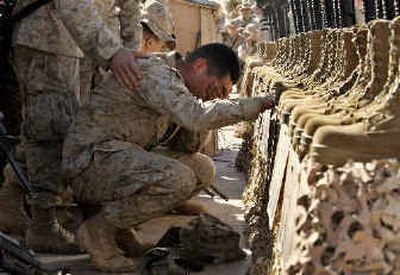Top Sunni clerics call Iraq’s vote illegitimate

BAGHDAD, Iraq – Iraq’s leading Sunni Muslim clerics said Wednesday the country’s landmark elections lacked legitimacy because large numbers of Sunnis did not participate in the balloting, which the religious leaders had asked them to boycott.
Emboldened by the elections, which U.S. and Iraqi authorities cited as a victory for democracy, the police chief in Mosul demanded the insurgents hand over weapons within two weeks or he would “wipe out” anyone giving them shelter.
The level of insurgent violence has appeared to drop sharply after the election – similar to the short-duration decline in attacks which occurred after the transfer of sovereignty to the interim Iraqi government in June.
It is unclear whether the drop is due to disillusionment within insurgent ranks, the effects of the stringent pre-election security measures that are being slowly relaxed, or whether the militants have paused to reassess their strategy in light of the ballot.
“The coming days and weeks will show whether this retreat will continue or whether it is tactical because of the strike against them,” interim Prime Minister Ayad Allawi told Al-Iraqiya television.
“I don’t know if what happened is a decrease (in attacks) that will continue or will escalate, but the final outcome is that it is a failure. They will continue for months but this (insurgency) will end. These dark forces will not be able to succeed.”
With the threat of election violence past, the U.S. Army handed over control Wednesday of several combat outposts to Iraqi security forces on the west side of Mosul, Iraq’s third-largest city.
Allawi, meanwhile, hosted a meeting of leaders from 16 of the country’s prominent political factions Wednesday, his office said.
The leaders, who included President Ghazi al-Yawer, Sunni elder politician Adnan Pachachi and Finance Minister Adel Abdul Mahdi, a Shiite, agreed to pursue the participation of all political, ethnic and religious groups in the new government, the statement said.
Large numbers of majority Shiite Muslims and Kurds participated in Sunday’s election for a new National Assembly and regional parliaments. Although no results or turnout figures have been released, U.S. officials say participation appeared much lower in Sunni areas where the insurgency is strongest.
The low turnout has been blamed variously on the clerics’ own boycott call and on fears of insurgent reprisals against those who voted.
In its first statement since the balloting, the Association of Muslim Scholars said the vote lacked legitimacy because of low Sunni participation. The association months ago urged Sunnis to shun the polls because of the presence of U.S. and other foreign troops, and insurgents threatened to kill anyone who voted.
Iraqi officials have acknowledged voting problems, including ballot shortages in Baghdad, Basra and Mosul, which have substantial Sunni populations and which also may have contributed to a low Sunni turnout.
With many Sunnis having stayed away, a ticket endorsed by the Shiite clergy is expected to gain the biggest number of seats in the 275-member National Assembly, followed by the Kurds and a list headed by Allawi, a secular Shiite.
Shiites comprise an estimated 60 percent of Iraq’s 26 million people, and Shiite candidates were expected to fare best regardless of Sunni turnout. However, low Sunni participation was believed to have reduced the totals of other tickets.
Abdul-Aziz al-Hakim, the Shiite Muslim who heads the ticket expected to have won the largest number of parliamentary seats, indicated in a Wednesday interview with the Associated Press that his group wants the post of prime minister in Iraq’s new government.
Al-Hakim, a Shiite cleric with close ties to Iran, said representatives of all Iraqi groups should participate in writing the new constitution.
In its statement, the Association of Muslim Scholars said the election “lacks legitimacy because a large portion of these people who represent many spectra have boycotted it.” As a result, the group said the new leadership lacked a mandate to draft a new constitution and should be considered a temporary administration.
“We make it clear to the United Nations and the international community that they should not get involved in granting this election legitimacy because such a move will open the gates of evil,” the statement said.
“We are going to respect the choice of those who voted and we will consider the new government – if all the parties participating in the political process agree on it – as a transitional government with limited powers.”
Official voter turnout figures have yet to be released, but a Western diplomat speaking on condition of anonymity Wednesday said turnout appeared to have been “quite low” in Iraq’s vast Anbar province, which includes the rebellious cities of Fallujah and Ramadi.
He said that based on anecdotal accounts, turnout in three other provinces with large Sunni Arab populations was slightly higher but not more than 50 percent.
Meanwhile, Carlos Valenzuela, the chief U.N. election expert in Iraq, told the AP that turnout in Sunni Arab areas was higher than expected, with lines forming outside polling centers in insurgency strongholds like Fallujah and Mosul.
Valenzuela cautioned, however, that forecasts for the Sunni areas were so low to begin with that even a higher-than-expected turnout would remain low.
In Mosul, police Gen. Mohammed Ahmed al-Jubouri offered amnesty to insurgents who handed over their weapons within two weeks but promised tough action if they did not. In an interview with the provincial television station, al-Jubouri threatened “to wipe out any village that would hide weapons after the two-week period and shell any safe haven for the insurgents.”
Meanwhile, insurgents blew up an oil pipeline Wednesday near the central city of Samarra, police said. The pipeline serves domestic power stations in Baghdad and Beiji and does not affect exports.
Four civilians were killed Wednesday in a drive-by shooting in Iskandariyah south of Baghdad, police said. The motive was unclear.